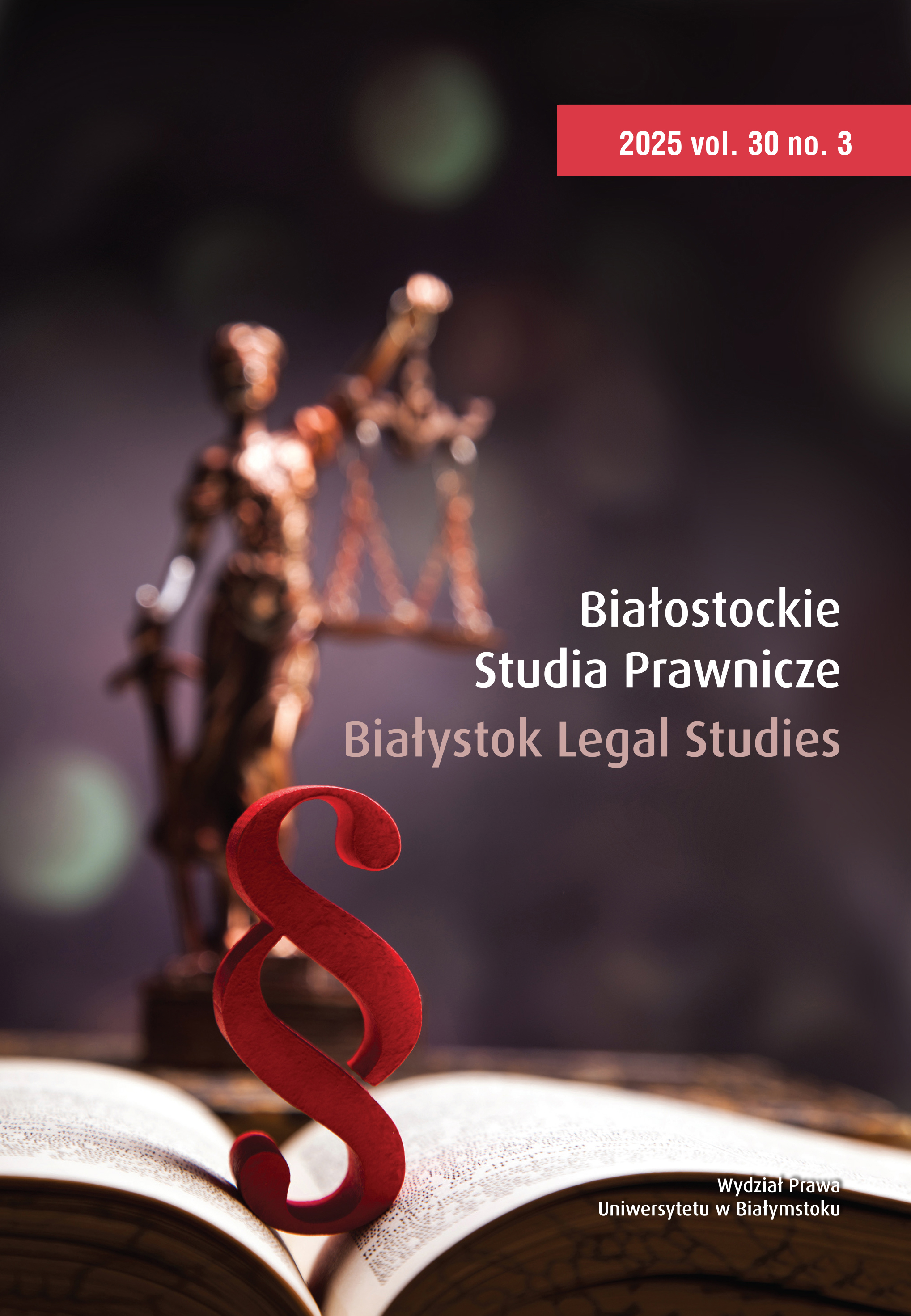Generative AI in International Trade Law: Navigating Opportunities and Challenges
Abstrakt
The subject of this article is an analysis of the impact of generative AI (GenAI) on international trade law, from the perspective of both the threats and the opportunities of integrating GenAI into international trade. It addresses topics including intellectual property law, international trade law principles, information security, trade negotiations, contracts, competition, liability and AI ethics. The authors employ a holistic approach, examining numerous applications of GenAI in international trade. They conclude with how the international legal framework for GenAI may help people navigate challenges and seize opportunities to benefi t international trade.Bibliografia
Ahmed, U., Naas, P., Evenett, S. J., & Kugler, K. (2024). ChatWTO: An analysis of generative artifi cial intelligence and international trade [White paper]. World Economic Forum – Global Future Council on International Trade and Investment.
Anwansedo, F., Gbadebo, A. D., & Akinwande, O. T. (2024). Exploring the role of AI-enhanced online marketplaces in facilitating economic growth: An impact analysis on trade relations between the United States and sub-Saharan Africa. Revista de Gestão Social e Ambiental, 18(6), 1–15. DOI:10.24857/rgsa.v18n6–139
Babikov, O., Fedorenko, I., Omelchenko, O., Lyseiuk, A., & Panova, O. (2024). Th e observance of human rights and freedoms during the covert obtaining of information in criminal proceedings. Białostockie Studia Prawnicze, 29(4), 197–215. DOI:10.15290/bsp.2024.29.04.12
Bar, A. (2024). Identyfi kacja pochodzenia i znakowanie treści syntetycznych a problem ochrony prawnoautorskiej wytworów powstających z wykorzystaniem sztucznej inteligencji. Zeszyty Naukowe Uniwersytetu Jagiellońskiego. Prace z Prawa Własności Intelektualnej, 3(165), 56–80.
Bar, A. (2025). Obrazy generowane z wykorzystaniem sztucznej inteligencji. Status prawnoautorski. Wolters Kluwer.
Baran, K. (2024). Th e right of trade unions to information in the era of the fourth and fi ft h industrial revolutions. Białostockie Studia Prawnicze, 29(2), 29–38. DOI:10.15290/bsp.2024.29.02.03
Chander, A. (2021). Artifi cial intelligence and trade. In M. Burri (Ed.), Big data and global trade law (pp. 115–127). Cambridge University Press. DOI:10.1017/9781108919234.008
Comunale, M., & Manera, A. (2024). Th e economic impacts and the regulation of AI: a review of the academic literature and policy actions [Working paper no. 24/65]. International Monetary Fund.
Congress of the United States of America. (1887). Interstate commerce act. Th e National Archives and Records Administration. https://www.archives.gov/milestone-documents/interstate-commerce-act
Council of Europe. (2024a). Council of Europe Framework Convention on Artifi cial Intelligence and Human Rights, Democracy and the Rule of Law, CETS no. 225, 17 May 2024. https://www.refworld.org/legal/agreements/coeministers/2024/en/148016
Council of Europe. (2024b). Treaty Offi ce: Chart of Signatures and Ratifi cations of Treaty 225: Council of Europe Framework Convention on Artifi cial Intelligence and Human Rights, Democracy and the Rule of Law: CETS no. 225. https://www.coe.int/en/web/conventions/full-list?module=signatures-by-treaty&treatynum=225
Dempsey, P. S. (2012). Th e rise and fall of the interstate commerce commission: Th e tortuous path from regulation to deregulation of America’s infrastructure. Marquette Law Review, 95(4), 1151–1189.
European Commission. (2023a, 30 October). Commission welcomes G7 leaders’ agreement on guiding principles and a code of conduct on artifi cial intelligence [Press release]. https://ec.europa.eu/commission/presscorner/detail/en/ip_23_5379
European Commission. (2023b, 30 October). Hiroshima Process international guiding principles for advanced AI systems [Policy and legislation]. https://digital-strategy.ec.europa.eu/en/library/hiroshima-process-international-guiding-principles-advanced-ai-system
European Commission. (2023c, 30 October). Hiroshima Process international code of conduct for advanced AI systems [Policy and legislation]. https://digital-strategy.ec.europa.eu/en/library/hiroshima-process-international-code-conduct-advanced-ai-systems
Fonseca Azevedo, M. da (2024). Navigating the AI frontier in international trade law [Working paper series no. 4/2024]. World Trade Institute.
Gaff ar, H., & Albarashdi, S. (2024). Copyright protection for AI-generated works: Exploring originality and ownership in a digital landscape. Asian Journal of International Law, 15, 23–46.
DOI:10.1017/S2044251323000735
Gienas, K. (2024). Trenowanie AI a prawo autorskie. Zeszyty Naukowe Uniwersytetu Jagiellońskiego. Prace z Prawa Własności Intelektualnej, 3(165), 5–55.
Igbinenikaro, E., & Adewusi, A. O. (2024a). Policy recommendations for integrating artifi cial intelligence into global trade agreements. International Journal of Engineering Research Updates, 6(1), 1–10. DOI:10.53430/ijeru.2024.6.1.0022
Igbinenikaro, E., & Adewusi, A. O. (2024b). Navigating the legal complexities of artifi cial intelligence in global trade agreements. International Journal of Applied Research in Social Sciences, 6(4), 488–505. DOI:10.51594/ijarss.v6i4.987
Jones, E. (2023). Digital disruption: Artifi cial intelligence and international trade policy. Oxford Review of Economic Policy, 39, 70–84. DOI:10.1093/oxrep/grac049
Judgment of the United States Court of Appeals for the District of Columbia Circuit of 18 March 2025 on the case of Th aler v. Perlmutter, 687 F. Supp. 3d 140 (D. D. C. 2023). https://media.cadc.uscourts.gov/opinions/docs/2025/03/23–5233.pdf
Judgment of the United States District Court for the District of Delaware of 11 February 2025 on the case of Th omson Reuters Enterprise Centre GmbH et al. v. Ross Intelligence Inc, no. 1:20-cv-00613-SB.
https://www.ded.uscourts.gov/sites/ded/fi les/opinions/20–613_5.pdf
Kamiński, M. (2024). Podmiot kompetencji administracyjnej w zautomatyzowanych procesach stosowania prawa na tle problematyki legitymacji prawno-demokratycznej delegowania kompetencji na systemy sztucznej inteligencji i odpowiedzialności prawnej za ich działania lub zaniechania. Prawo i Więź, 53(6), 239–263. DOI:10.36128/PRIW.VI53.1102
Karska, E. (2019). Nowe tendencje w międzynarodowym prawie ochrony praw człowieka jako odpowiedź na zmiany. In A. Tarwacka (Ed.), Tempora Mutantur Cum Legibus. Księga Jubileuszowa z okazji 20-lecia Wydziału Prawa i Administracji Uniwersytetu Kardynała Stefana Wyszyńskiego w Warszawie (pp. 48–58). Wolters Kluwer.
Karska, E. (2021). Draft ing an international legally binding instrument on business and human rights: Th e next step towards strengthening the protection of human rights. International Community Law Review, 23(5), 466–485. DOI:10.1163/18719732–23050004
Karska, E. (2022). Biznes i prawa człowieka – perspektywa Europy Środkowo-Wschodniej. In E. Cała-Wacinkiewicz, J. Menkes, J. Nowakowska-Małusecka, & W. S. Staszewski (Eds.), Stosunki sąsiedzkie w świetle prawa międzynarodowego (pp. 241–253). C. H. Beck.
Karska, E., & Karski, K. (2021). Special issue editorial. Business and human rights: Legal aspects. International Community Law Review, 23(5), 427–432. DOI:10.1163/18719732–23050001
Karska, E., & Karski, K. (2023). Current challenges of international and European human rights law: Introductory remarks. International Community Law Review, 25(6), 539–545. DOI:10.1163/18719732-bja10112
Karski, K., & Ziemblicki, B. (2021). Commercial companies as applicants before the European Court of Human Rights. International Community Law Review, 23(5), 503–525. DOI:10.1163/18719732–23050006
Khan, A. (2024). Th e intersection of artifi cial intelligence and international trade laws: Challenges and opportunities. IIUM Law Journal, 32(1), 104–107. DOI:10.31436/iiumlj.v32i1.912
Kleinberg, J., Ludwig, J., Mullainathan, S., & Sunstein, C. R. (2018). Discrimination in the age of algorithms. Journal of Legal Analysis, 10, 113–174. DOI:10.1093/jla/laz001
Köksal, B., & Sarel, R. (in press). Th e smart contracts trilemma. University of Illinois Law Review, 1–64. DOI:10.2139/ssrn.4689013
Kowalski, M. (2024). Th e impact of artifi cial intelligence on the future functioning of administrative courts. Prawo i Więź, 53(6), 173–185. DOI:10.36128/PRIW.VI53.988
Kużelewska, E., & Piekutowska, A. (2023). Belarus’ violation of international obligations in connection with artifi cial migration pressure on the Belarus–European Union border. Białostockie Studia Prawnicze, 28(1), 39–55. DOI:10.15290/bsp.2023.28.01.03
Lin, C.-F (2021). Public morals, trade secrets, and the dilemma of regulating automated driving systems. In S.-Y. Peng, C.-F. Lin, & T. Streinz (Eds.), Artifi cial intelligence and international economic law (pp. 237–254). Cambridge University Press. DOI:10.1017/9781108954006.013
Markiewicz, R. (2023). ChatGPT i prawo autorskie Unii Europejskiej. Zeszyty Naukowe Uniwersytetu Jagiellońskiego. Prace z Prawa Własności Intelektualnej, 2(160), 143–171.
Méndez, M. L., & Kurzynoga, M. (2023). Th e presumption of the employment relationship of platform workers as an opportunity to eliminate obstacles arising from competition law in the conclusion of a collective agreement: Th e example of Spain. Białostockie Studia Prawnicze, 28(4), 197–216. DOI:10.15290/bsp.2023.28.04.12
Meyer, T., Marsden, C., & Brown, I. (2020). Regulating internet content with technology: Analysis of policy initiatives relevant to illegal content and disinformation online in the European Union. In G. Terzis, D. Kloza, E. Kużelewska, & D. Trottier (Eds.), Disinformation and digital media as a challenge for democracy (pp. 309–326). Intersentia.
Ministry of Foreign Aff airs of Japan. (2019). G20 AI principles. https://www.mofa.go.jp/policy/economy/g20_summit/osaka19/pdf/documents/en/annex_08.pdf
Nizza, U. (in press). What do AIs think about the AI Act? An experimental analysis of the EU approach on artifi cial intelligence. European Business Law Review, 36(2), 1–20. DOI:10.2139/ssrn.4976521
Organisation for Economic Co-operation and Development (OECD). (2024). Revised recommendation of the Council on Artifi cial Intelligence, adopted on 3 May 2024, C/MIN(2024)16/FINAL. Organisation for Economic Co-operation and Development https://one.oecd.org/document/C/MIN(2024)16/FINAL/en/pdf
Peng, S.-Y., Lin, C.-F., & Streinz, T. (2021). Artifi cial intelligence and international economic law: A research and policy agenda. In S.-Y. Peng, C.-F. Lin, & T. Streinz (Eds.), Artificial intelligence and international economic law (pp. 1–26). Cambridge University Press. DOI:10.1017/9781108954006.002
Shaff er, G. (2021). Trade law in a data-driven economy: Th e need for modesty and resilience. In S. Y. Peng, C.-F. Lin, & T. Streinz (Eds.), Artifi cial intelligence and international economic law (pp. 29–53). Cambridge University Press. DOI:10.1017/9781108954006.00
Th ankGod, J. C. (2023). Artifi cial intelligence and international trade law: Navigating legal challenges in the age of automation. SSRN Electronic Journal. DOI:10.2139/ssrn.4706943
United Nations Educational, Scientifi c and Cultural Organization (UNESCO). (2021, 23 November). Recommendation on the ethics of artifi cial intelligence, adopted on 23 November 2021. https://unesdoc.unesco.org/ark:/48223/pf0000381137
World Intellectual Property Organization (WIPO). (1979). Berne Convention for the Protection of Literary and Artistic Works (as amended on 28 September 1979) (authentic text), TRT/BERNE/001. https://www.wipo.int/wipolex/en/text/283698
World Trade Organization (WTO). (2017a). General Agreement on Trade in Services (GATS), Annex 1B. https://www.wto.org/english/docs_e/legal_e/gats_e.htm
World Trade Organization (WTO). (2017b). Agreement on Trade-Related Aspects of Intellectual Property Rights (TRIPS) (as amended on 23 January 2017). Annex 1C. https://www.wto.org/english/ docs_e/legal_e/31bis_trips_e.pdf



